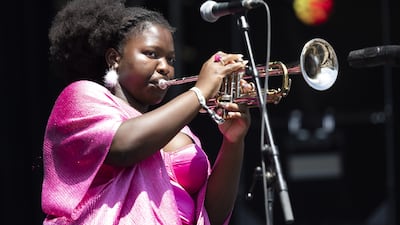Kokoroko are picking up where they left off.
Formed in 2014, the London collective built a formidable name in the UK and Europe with their fluent and energetic melding of jazz and African funk genres from Nigerian Afrobeat to Ghanaian Highlife.
After slaying festival audiences across the continent, the group released an eponymous 2019 EP that amassed more than 68 million streams on major music platforms.
The momentum only increased the anticipation surrounding debut album Could We Be More and, fortunately, for the most part, the group fulfilled its promise.
Led by trumpeter Sheila Maurice-Grey, the octet conjures up a vibrant 15-song set that harvests various influences from London to Lagos.
A sinewy Afrobeat groove carries Adwa, a strident piece punctured by the occasional thrilling horn explosion from saxophonist Cassie Kinoshi.
Tojo is a lovely marriage of past and future. The latter is supplied by Yohan Kebede's psychedelic keyboard riffs while the horn section, led by Maurice-Grey, delivers the kind of vintage arrangement recalling Fela Kuti.
Age of Ascent lives up to its esoteric title and finds the group slowing things down for a track cinematic in scope, while Eva Inu is a showcase for the group's lethal rhythm section of bassist Duane Atherley and drummer Ayo Salawu.
While largely instrumental, Could We Be More has a few vocal tracks.
The standout, Those Good Times, features a silky vocal by Maurice-Grey that takes the music towards neo-soul territory and provides an intriguing prospect on what direction Kokoroko can go next.
The smooth track also reveals the slight and niggling weakness running throughout Could We Be More, in that it can feel overproduced and doesn’t fully summon the energy of their pulsating live show.
This is best exemplified in War Dance, which despite its intention to be a rhythmic and sweaty number, seems too sanitised and polished to elicit the kind of primal dancing response seen when people see Kokoroko live.
That said, these are relatively minor gripes in what is a supremely assured debut album.


